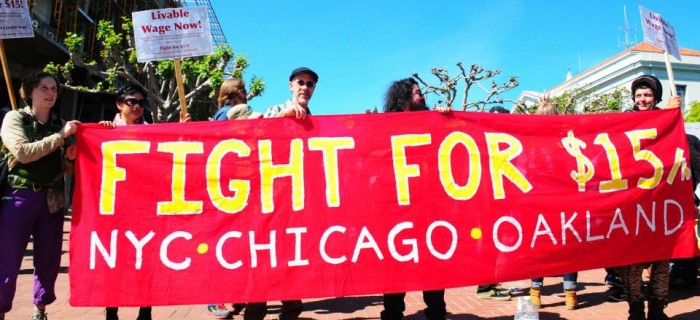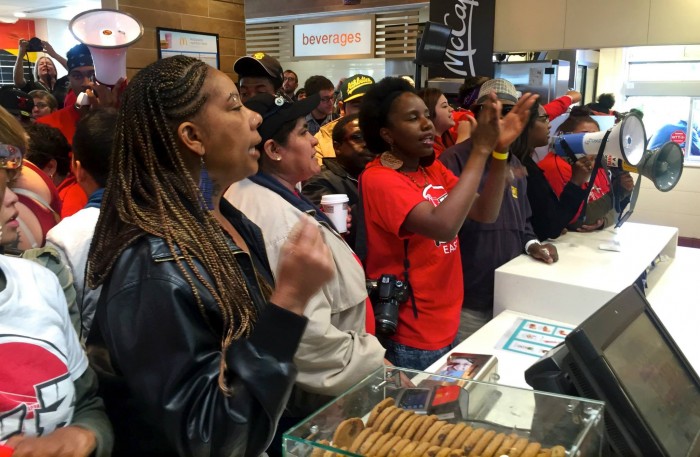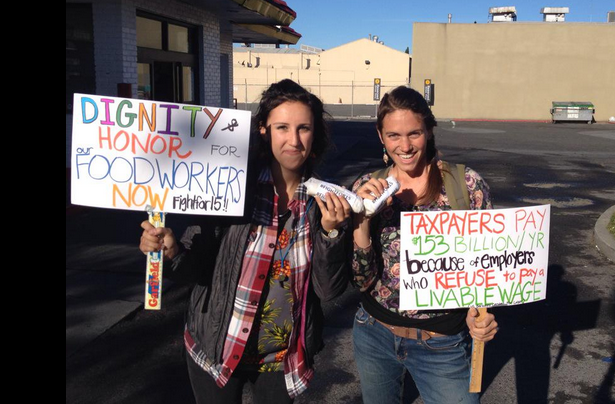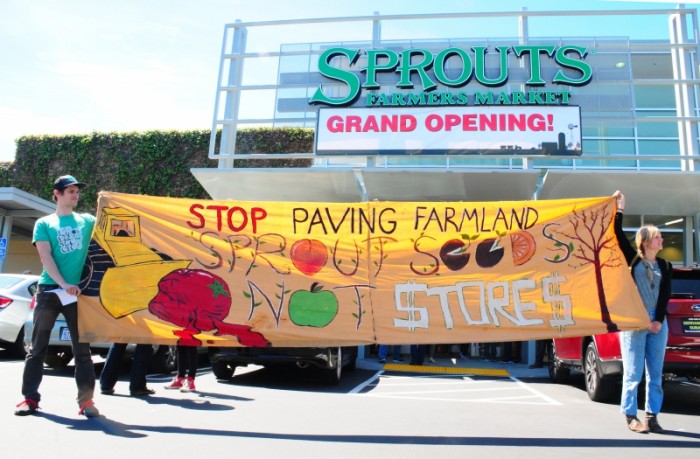Oakland’s Fight for 15 Protest: Urban farmers in solidarity with fast food workers
At 8am on April 15, 2015, urban farmers, activists, and fast food workers joined forces in Oakland against the fast food industry’s poverty wages and unjust working conditions. The demonstration was part of an international day of protest organized by the Fight for 15 workers’ movement, the largest day of protests by low-wage workers in US history. Urban farmers from the University of California Gill Tract Community Farm and representatives from the food justice organizations Phat Beets Produce, Movement Generation, and Food First joined Oakland fast food workers in protest. The group shut down the McDonald’s on San Pablo and 66th in Oakland’s Golden Gate district, chanting “What do we do when workers’ rights are under attack? Stand up fight back!” and “What do we want? 15 and a union! When do we want it? Now!”
The protesters handed out burritos to hungry customers and staff made with local, organic ingredients from the Gill Tract farm. Inside the Mcdonald’s, one worker spoke out: “You are leaving the next generation with an industrial agriculture system that destroys land, pollutes air, and wastes water. All made possible and profitable by our cheap labor…” Though this fight is prominently led by food workers, the farmer-worker solidarity in Oakland was emblematic of the growing alliance between different sectors of our food system, which recognizes that the struggle for economic justice is inextricable from the struggles for environmental, racial, and food justice.
In the US today, 42 percent of laborers earn less than $15 an hour: 36.4 percent of whites, 54.1 percent of African Americans and 59.5 percent of Latinos are paid poverty wages, revealing an economic system based on the exploitation of human labor and divided along color lines. Racial and economic inequality also underlies the nation’s health crisis, where diet-related diseases disproportionately impact communities of color that are being paid the lowest wages. According to a recent study by the UC Berkeley Labor Center, 52 percent of fast food workers rely on public assistance to meet their basic needs, with US taxpayers paying roughly $153 billion per year to subsidize corporations that pay poverty wages.
Though the food retail industry is the fastest growing industry in the country, retailers are not only lowering wages, but also cutting hours to disqualify their employees from paid sick days and health benefits that are guaranteed to full-time employees. Today, 90 percent of all food workers do not receive these common employee benefits and experience levels of food insecurity at twice the rate of the general population.
From the Black Lives Matter movement to students protesting the privatization of public universities; from farmworkers striking in Washington and Baja California to fast food workers striking in Boston and New York; the fundamental problem is the massive concentration of wealth, power, and resources. These seemingly disconnected social movements are all working towards a common goal: the democratization of our political, economic, and food system.
Stay in the loop with Food First!
Get our independent analysis, research, and other publications you care about to your inbox for free!
Sign up today!Later in the day on April 15, fast food workers joined the urban farmers at another rally held outside of the San Rafael Sprouts supermarket. For twenty years, UC Berkeley students and community members have been resisting the University of California’s attempt to sell off one of the last remaining pieces of prime urban farmland in the Bay Area, a plot known as the Gill Tract. Sprouts, which calls itself a “farmers market,” now has plans to purchase the Gill Tract to erect a store in its place that neither sells local produce nor pays workers a fair wage. Over the megaphone, activists argued that a true farmer’s market sells food from local farmers and helps small farmers and their employees to earn a living wage.
“The billion dollar fast food industry and the industrial agricultural system it depends on erodes our soil, contaminates our water, and destroys our health,” says Vanessa Raditz, a farmer at the Gill Tract, “fast food’s poverty wages mean that low-income workers are unable to afford healthy, local produce. The Gill Tract farm seeks to expand alternatives to industrial agriculture, while also distributing affordable healthy food.”
In the face of environmental, health, and economic crises, the movement to save the Gill Tract, known as “Occupy the Farm,” offers an alternative model to corporate, industrial agriculture. It is an alternative in which the students and community jointly make decisions about their food system and promote healthy diets and dignified livelihoods, rather than corporate profit.
Beyond advocating for organic, healthy, and local food, the food movement must stand behind farmworkers and food workers fighting for fair pay and just working conditions on the ground. Fight for 15 is not only a fight against fast food corporations, it is an uprising to regain power over our food system and transform it into a source of dignified livelihoods, environmental resiliency, and healthy food for all.
Join the Thunderclap campaign by April 27th.
Featured image at top: photo by Kelly Johnson Revolutionary Photography.
Fight for 15: The McDonald’s on San Pablo
Fight for 15: Robert Reich Goes to McDonald’s





 Help Food First to continue growing an informed, transformative, and flourishing food movement.
Help Food First to continue growing an informed, transformative, and flourishing food movement.




